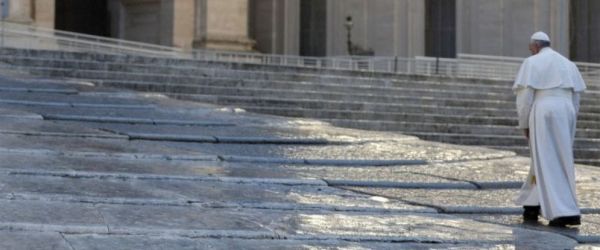We are the 'dream of God' who, as a true lover, wants to 'change our lives'. Out of love indeed. He only asks us to have the faith to let him do it. And so "we can only weep with joy" before a God who "re-creates" us, said Pope Francis in the Mass celebrated on Monday 16 March, in the chapel of the Casa Santa Marta.
In the first reading, taken from Isaiah (65:17-21), "the Lord tells us that he creates new heavens and new earths, that is, he 're-creates' things," Francis pointed out, also recalling that "several times we have spoken of these 'two creations' of God: the first, the one that was made in six days, and the second, when the Lord 'remakes' the world, ruined by sin, in Jesus Christ." And, he pointed out, "we have said many times that this second is more wonderful than the first". In fact, the Pope explained, 'the first is already a marvellous creation; but the second, in Christ, is even more marvellous'.
In his meditation, however, Francis chose to dwell "on another aspect", starting precisely from the passage from Isaiah in which, he explained, "the Lord speaks of what he will make: a new heaven, a new earth". And "we find that the Lord has such enthusiasm: he speaks of joy and says one word: 'I will enjoy my people'". In essence, 'the Lord thinks about what he is going to do, he thinks that he, himself, will be in joy with his people'. So 'it is as if it were a "dream" of the Lord, as if the Lord "dreamed" of us: how good it will be when we will all be together, when we will be there or when that person, that other person will walk...'.
Further clarifying his reasoning, Francis resorted to "a metaphor that can make us understand: it is as if a girl with her fiancé or a boy with his fiancée thought: when we will be together, when we will get married...". Here, indeed, is 'the "dream" of God: God thinks of each of us, he loves us, he dreams of us, he dreams of the joy he will enjoy with us'. And it is precisely 'for this that the Lord wants to "re-create" us, to "re-create" our heart to make joy triumph'.
All this led the Pope to suggest some questions: "Have you ever thought: does the Lord dream of me? Does he think of me? Am I in the mind, in the heart of the Lord? Is the Lord able to change my life?". Isaiah, Francis added, also tells us that the Lord "makes many plans: we will build houses, we will plant vineyards, we will eat together: all those plans typical of a lover".
Moreover, "the Lord shows himself in love with his people" going so far as to say: "But I have not chosen you because you are the strongest, greatest, most powerful; but I have chosen you because you are the least of all". More, "one could say: the most miserable of all. But I have chosen you in this way, and this is love'.
"From there," said the Pope, "this continuous desire of the Lord, this desire of his to change our lives. And we can say, if we listen to this invitation from the Lord: 'You have changed my lament into a dance'", that is, the words "that we prayed" in Psalm 29. "I will exalt you, Lord, because you have lifted me up", the psalm goes on to say, thus recognising that the Lord "is capable of changing us, out of love: he is in love with us".
"I believe there is no theologian who can explain this: it cannot be explained," Francis remarked. Because 'on this one can only reflect, feel and weep with joy: the Lord can change us'. At this point the question arises: what should I do? The answer is clear: 'Believe, believe that the Lord can change me, that he can'. Exactly what the king's official who had a sick son in Capernaum did, as John recounts in his Gospel (4:43-54). That man, we read, asked Jesus "to come down and heal his son, because he was about to die". And Jesus answered him: "Go, your son lives!". So that father 'believed the word that Jesus had told him and set out: he believed, he believed that Jesus had the power to heal his child. And he was right'.
"Faith," Francis explained, "is making space for this love of God; it is making space for the power, the power of God, the power of one who loves me, who is in love with me and who desires joy with me. This is faith. This is believing: it is making room for the Lord to come and change me".
The Pope concluded with a significant note: "It is curious: this was the second miracle that Jesus performed. And he did it in the same place where he did the first one, at Cana of Galilee". Indeed, in today's Gospel passage we read: "He went therefore again to Cana of Galilee, where he had changed water into wine". Again "at Cana of Galilee he also changed the death of this child into life". Truly, Francis said, 'the Lord can change us, he wants to change us, he loves to change us. And this, out of love'. To us, he concluded, "he asks only for our faith: that is, to give space to his love so that he can act and make a change of life in us".
[Pope Francis, S. Marta homily, in L'Osservatore Romano 16-17/03/2015]












